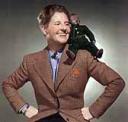I (heart) several books
It's here, my big day in South Florida biblio-journalism. First, a review in the Miami Herald of Larry's Kidney, an entertaining account of two cousins and their quest in China for a kidney, a bride and a better understanding of their relationship. And by the way props to The Herald and to the hardworking book (and Weekend section) editor Connie Ogle for keeping on keeping on in this economic climate. The Sun-Sentinel recently laid off longtime book editor Chauncey Mabe -- he'll still be doing freelance book reviews for them but it's a major institutional loss for South Florida readers. Anyway. I also had a manifesto about how people do too read books so there in today's Solares Hill but sadly I can't provide a link because The Citizen has a very strange approach toward online access. Enough said. If you happen to be in the Florida Keys you can get yourself a Sunday paper. Or you could buy the whole Sunday paper online and get a PDF that includes Solares Hill. Basically my point was the publishing industry is in some trouble but people are still reading, based on my observations at the circulation desk at the Monroe County Library's May Hill Russell Branch and also because of human nature (we crave drama and narrative in whatever form we can get it). And I gave a somewhat random summer reading list -- random because unlike real professional book writers I'm not recommending all new books because I don't have access to all those books, but just fun, mostly lighter reads I've come across in the last year or so. Unfortuantely they didn't have time to include a last-minute addition to the list of Vern's book, The Lost Chalice, but I'm sure you'll be hearing more about that from me and others in the near future.
Summer Reading Recommendations:
"Stone’s Fall" by Iain Pears – This is a brand new novel, from the author of “The Instance of the Fingerpost.” It’s historical fiction with a mystery at its heart – why did financier and industrialist Julius Stone take a header out of his living room window? It proceeds in several chunks with different narrators, heading back through time, from post-World War II Paris to Venice in 1867. Long but absorbing.
"Martyr" by Rory Clement – Another new one, by an English journalist turned novelist. This is historical fiction set during the reign of Elizabeth I and uses an older brother of William Shakespeare, named John, as its protagonist, a sort of Renaissance detective in the service of Sir Francis Walsingham. If you are a fan of Philippa Gregory, Jean Plaidy or other fictions set in this time period, this is a worthy addition with more attention paid to ordinary people caught up in the religious wars than the machinations of royalty. (Note: the comments on this book have been edited after I received the comment from Clements, posted below -- a very nice man as well as a good writer and a good reminder to me that even though I write this stuff in a kind of personal, casual style it's still publication.)
“The Suspicions of Mr. Whicher” by Kate Summerscale – Another work set in the past, this one nonfiction. It’s about a murder that takes place in an upper class home – the murder of a small child – and the London detective who arrives to solve the case. Summerscale skillfully blends the shocking story itself as well as the social milieu in which it happened (Victorian England) and the literary influences Whicher and the case had (the birth of the detective novel).
“The Lost City of Z” by David Grann – In 1925, Sir Percy Fawcett set off into the Amazon looking for the fabled South American city usually called El Dorado but known in his journals and letters simply as Z. His companions were his young son and the son’s friend, neither of whom had any experience in that environment. They never returned. Fawcett’s obsession, and the quest to find out what happened to him, are parallel tracks in this book and Grann himself ventures into the still-hostile environment. His conclusions are surprising and surprisingly persuasive.
“The Book of Air and Shadows” by Michael Gruber – I am not a Dan Brown fan but I’m fond of bibliothrillers – pageturners with a rare book or manuscript at their heart – and this is the best one I’ve found yet. The item at issue in this case is a lost Shakespeare manuscript but it’s Gruber’s writing, and the voice of his protagonist – a former Olympic weightlifter turned attorney – that kept me enthralled.
“Blindspot” by Jane Kamensky and Jill Lepore – Two eminent historians – one a professor at Harvard the other at Tufts – write a novel. Together. This sounds like it could have been a very bad idea. Instead, it’s a ton of fun. Set in Boston a decade before the American Revolution, it is the story of a penniless Scottish painter and his apprentice, whom he believes to be a 16-year-old boy but who is actually the 21-year-old disgraced daughter of a prominent Boston family. What are the odds they’ll fall in love? Told in alternating voices – the painter’s traditional first person picaresque novel, the apprentice’s letters to a childhood friend – it is a lusty romance but also deals with serious issues like gender, sexual orientation, race and political liberty. Not to mention art.
“His Majesty’s Dragon” by Naomi Novik – I can’t believe I’m publicly admitting that I read and loved a book with dragons – so I might as well admit I read and loved FIVE books with dragons, all in the series called Temeraire (after, of course, is our protagonist dragon). “His Majesty’s Dragon” and its sequels are terrific. They are set in the Napoleonic Wars and are commonly described as “Patrick O’Brian with dragons.” Alternate history, fantasy, call it what you will. But if you’re at all interested, just give it a try. Here’s a heresy for you: I think Novik is actually better than O’Brian at conveying the terrible carnage Napoleon wreaked across Europe, since so much of her books are set on land, as opposed to sea. Seriously, not counting Harry Potter I hadn’t read anything with dragons in it since junior high. Now I’m counting the days until the next installment comes out in October.
“One Good Turn” by Kate Atkinson – Actually you should probably start from the beginning of this trilogy, “Case Histories,” which features former cop turned private detective Jackson Brodie. They’re mysteries, with Brodie solving some puzzle or other usually with a couple of bodies along the way, but they truly excel as character studies and Atkinson is a fabulous writer – funny and humane and totally original. Her first novel won the Whitbread Award, so she’s got the literary chops – and unlike some other literary types she doesn’t feel compelled to adopt a pseudonym when she writes a crime novel that can be pigeonholed as genre work. The third in this series, by the way, is called “When Will There Be Good News?” I just listed OGT because it was my favorite, possibly because it’s the first one I read.
“The Given Day” by Dennis Lehane – Best known for crime novels like “Mystic River,” Lehane swung for the fences in this epic historical novel, set in Boston in 1919 – a time when World War I had just ended, the city was beset by fears of anarchist terrorism, influenza was wiping out populations. The book culminates in the Boston Police strike, a historic event, and takes in different parts of society, including Irish, Italian and African-American.
“Julie & Julia” by Julie Powell – This memoir is about to come out as a movie, starring Meryl Streep and Amy Adams, directed by Nora Ephron. So brace yourselves: It will be everywhere. Despite the fact that this book started out as a blog based on a gimmicky premise – young New Yorker Julie Powell attempts to cook every recipe in Julia Child’s “Mastering the Art of French Cooking” in a year – it’s a fun, endearing read. And it’s not just a blog committed to paper; it’s a real memoir, chronicling love, family, society and the knotty problem of what to do when you’re turning 30 and your original ambitions just aren’t panning out.


